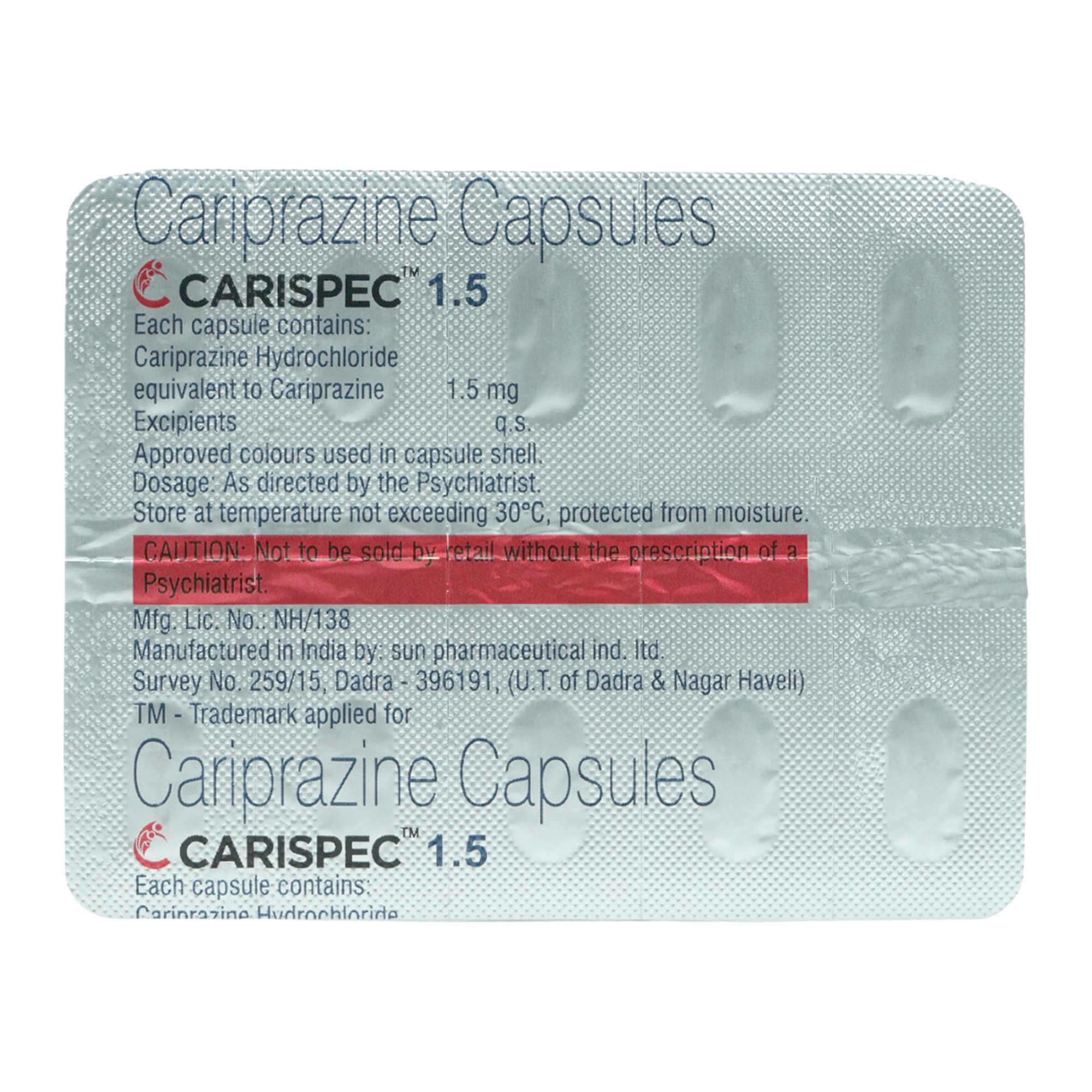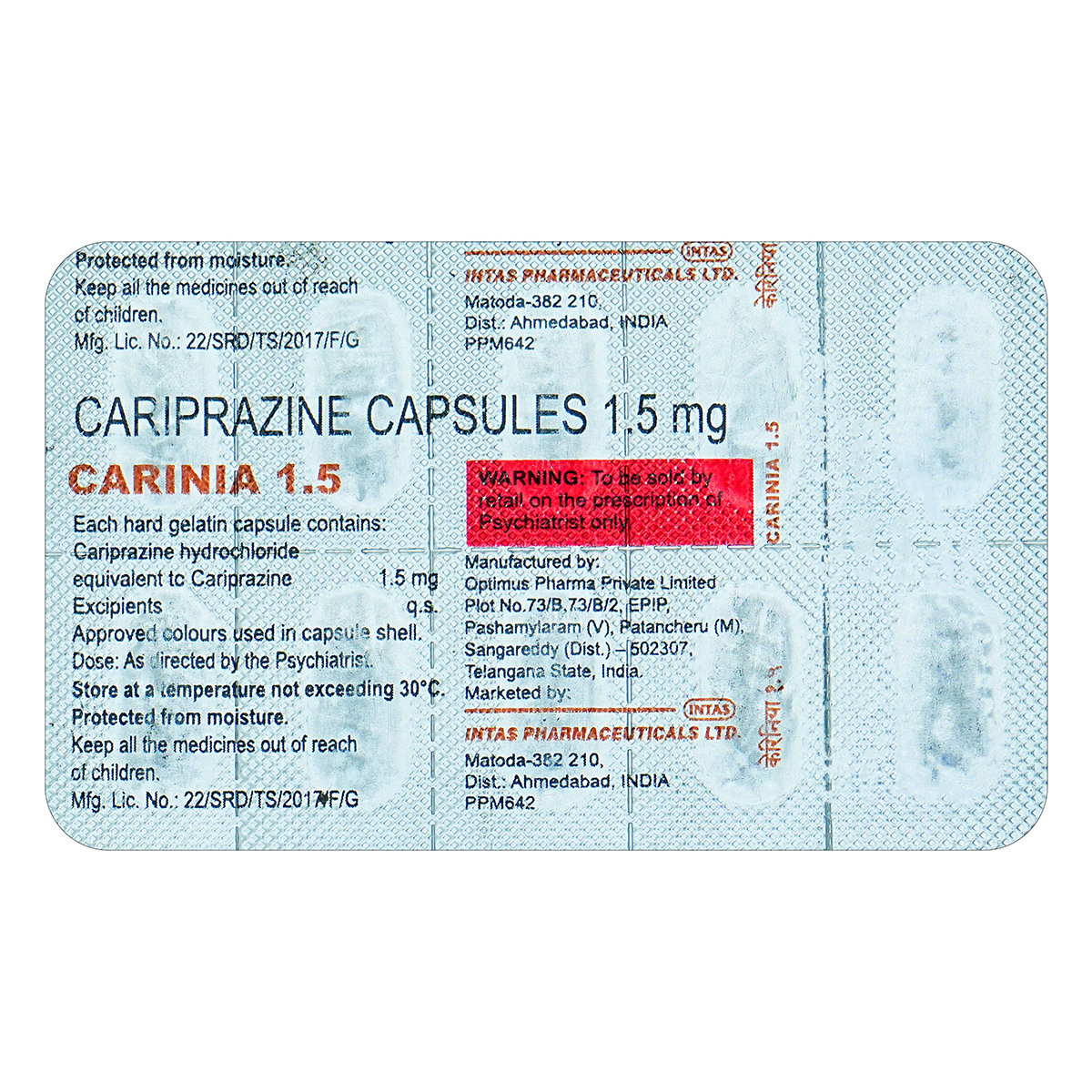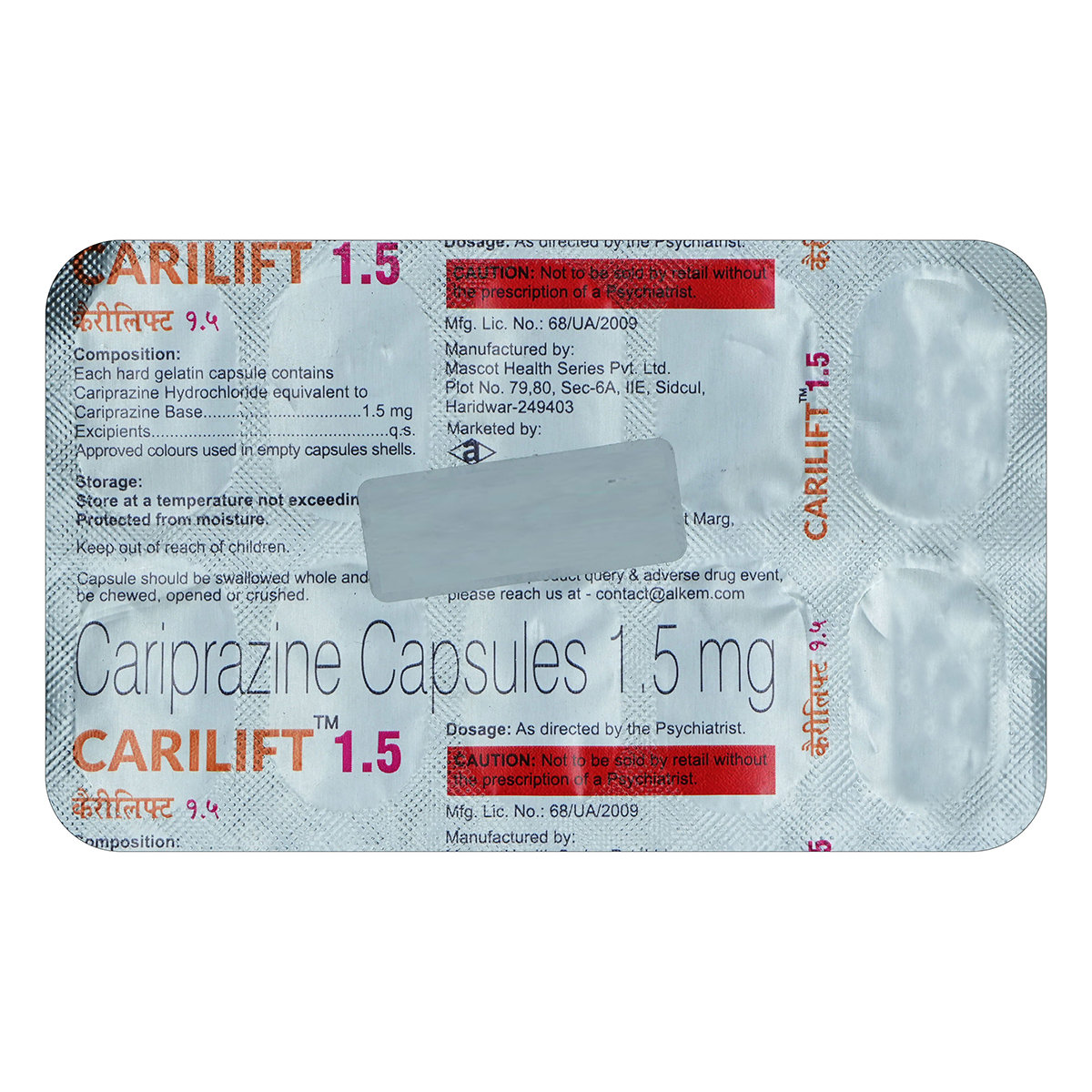Caripriza 1.5 Capsule 10's
MRP ₹101
(Inclusive of all Taxes)
₹15.2 Cashback (15%)
Provide Delivery Location
Online payment accepted
 Prescription drug
Prescription drugWhats That
Composition :
Manufacturer/Marketer :
Consume Type :
Expires on or after :
Return Policy :
About Caripriza 1.5 Capsule
Caripriza 1.5 Capsule belongs to a group of medicines called 'antipsychotics,' primarily used to treat psychotic disorders like schizophrenia. It also treats manic or mixed episodes in adults with bipolar disorder type I.
Caripriza 1.5 Capsule consists of 'Cariprazine,' an atypical antipsychotic. It works by affecting the balance of the neurotransmitters in the brain. Thereby, Caripriza 1.5 Capsule decreases psychotic symptoms like hallucinations and agitated behaviour associated with schizophrenia. It also treats depressive episodes in bipolar disorder type I/bipolar depression in adults.
Your doctor will decide the dose and duration based on your medical condition and response to treatment. Common side effects include restlessness, tiredness, drowsiness, dizziness, tremors/shakiness, blurred vision, difficulty moving or slow movements, involuntary muscle movements, excess saliva/drooling, constipation, upset stomach, nausea, vomiting, increased appetite, weight gain. These side effects are not familiar to everyone and vary individually. If you notice any side effects that are not manageable, please consult your doctor.
Caripriza 1.5 Capsule is not recommended for treatment in patients with dementia-related psychosis. Inform your doctor before starting Caripriza 1.5 Capsule if you have a history of liver/kidney/heart diseases, stroke, high blood pressure, diabetes, high cholesterol levels, swallowing problems, low white blood cell count, or fits. If you are pregnant, planning pregnancy, or breastfeeding, inform your doctor before using Caripriza 1.5 Capsule . Avoid consuming alcohol while being treated with Caripriza 1.5 Capsule as it can make you dizzy or drowsy. Do not drive or operate machinery since this medicine can make you sleepy and interfere with your driving ability. The safety and efficacy of Cariprazine in children and adolescents under 18 years have not been established.
Uses of Caripriza 1.5 Capsule
Directions for Use
Key Benefits
Caripriza 1.5 Capsule is used to treat schizophrenia and associated psychotic symptoms. It contains Cariprazine, which affects the balance of the neurotransmitters in the brain. It helps in clear thinking and relieves psychotic symptoms like hallucinations in schizophrenia. It treats depressive episodes in bipolar disorder type I in adults. It is also an adjunctive therapy to antidepressants in treating major depressive disorder (MDD) in adults.
Storage
Drug Warnings
Caripriza 1.5 Capsule is not recommended for treatment in elderly patients with dementia-related psychosis. Before using Caripriza 1.5 Capsule , let your doctor know if you have a history of liver or kidney diseases, heart problems, stroke, high blood pressure, diabetes, high cholesterol levels, swallowing problems, low white blood cell count, obesity, dehydration, or fits. Please consult your doctor if you are pregnant, planning to conceive or a breastfeeding mother before starting Caripriza 1.5 Capsule . Avoid consuming alcohol during the treatment, as it might increase dizziness and drowsiness. Avoid driving or operating machinery, as this medicine may decrease your mental alertness, making you feel dizzy or drowsy. Caripriza 1.5 Capsule is not recommended for patients below 18 years of age as safety and effectiveness have not been established.
Diet & Lifestyle Advise
- Maintain proper weight by following a healthy diet.
- Exercise regularly as it helps in less cognitive decline and brain volume loss.
- Avoid smoking and alcohol consumption.
- Try to avoid stress by practising meditation or yoga.
- Include fruits and vegetables in your diet as they contain antioxidants.
- Eat nutritious food as it helps in cognitive stimulation.
- Limit foods with high cholesterol and saturated fats.
- Cut down on sugar, salt and processed foods.
- Drink plenty of water.
- Follow a healthy lifestyle as it helps improve overall health and possibly protects the brain.
Side Effects of Caripriza 1.5 Capsule
- Restlessness
- Tiredness
- Drowsiness
- Dizziness
- Tremors/shakiness
- Blurred vision
- Difficulty moving or slow movements
- Involuntary muscle movements
- Excess saliva/drooling
- Nausea
- Vomiting
- Constipation
- Upset stomach
- Increased appetite
- Weight gain
Habit Forming
Therapeutic Class
All Substitutes & Brand Comparisons
RX
Carispec 1.5 Capsule 10's
Sun Pharmaceutical Industries Ltd
₹100
(₹9.0 per unit)
RX
Caripzin-1.5 Capsule 10's
Tripada Lifecare Pvt Ltd
₹90
(₹9.0 per unit)
RX
Carinia 1.5 Capsule 10's
Intas Pharmaceuticals Ltd
₹101.5
(₹9.14 per unit)
Author Details
We provide you with authentic, trustworthy and relevant information
FAQs
Drug-Drug Interactions Checker List
- KETOCONAZOLE
- FLUCONAZOLE
- PHENYTOIN
- PHENOBARBITAL
- METOCLOPRAMIDE
Special Advise
- Caripriza 1.5 Capsule is not approved for the treatment of patients with dementia-related psychosis
- Let your doctor know that you are taking Caripriza 1.5 Capsule if you are undergoing any medical tests.
- Weight gain has been noticed in patients who use Cariprazine; hence, regular weight monitoring is recommended.
- Orthostatic hypotension is also recorded in patients using this medicine. Hence caution is recommended in patients with cardiovascular and cerebrovascular diseases.
- Caripriza 1.5 Capsule may affect blood glucose levels; hence it is advised to monitor blood sugar levels regularly while using Caripriza 1.5 Capsule .
- Timely monitoring of the cholesterol/triglyceride levels is advised for the patient while using this medicine.
Disease/Condition Glossary
Schizophrenia: It is a condition in which the person may see, hear or feel things that are not there, believe things that are not true, or feel unusually suspicious or confused. Symptoms include hallucinations, delusions, thought disorders, movement disorders, disorganised thinking, loss of interest, lack of emotions, etc. Schizophrenia is triggered by physical, genetic, psychological, and environmental factors. Patients suffering from this disease may require lifelong treatment. Treatment involves a combination of medications, psychotherapy and care services.
Bipolar I disorder: It is a serious brain disorder in which a person goes through unusual mood changes (mood swings) and frequent changes in his/her behaviour and thinking. The symptoms may last at least seven days (most of the day, nearly every day), or the manic symptoms are so severe that the person needs immediate hospital care. Treatment involves mood stabilizers, antipsychotics, and sometimes sedative-hypnotics.

Have a query?
Alcohol
Safe if prescribed
Avoid alcohol consumption while using Caripriza 1.5 Capsule . Alcohol intake while being treated with Caripriza 1.5 Capsule , may cause increased dizziness and drowsiness. Please consult your doctor for more information.
Pregnancy
Consult your doctor
Using antipsychotic drugs during the third trimester of pregnancy may cause extrapyramidal (drug-induced movement disorders) and/or withdrawal symptoms in newborn babies. Please consult your doctor before taking Caripriza 1.5 Capsule if you are pregnant or planning to conceive. Your doctor will weigh the potential risks and benefits before prescribing Caripriza 1.5 Capsule .
Breast Feeding
Consult your doctor
It is not known if Cariprazine is excreted into breast milk. Please consult your doctor before taking Caripriza 1.5 Capsule if you are a breastfeeding mother.
Driving
Safe if prescribed
Caripriza 1.5 Capsule may make you feel dizzy or drowsy. Do not drive if you are not mentally alert or experience any symptoms that affect your ability to drive or operate machinery.
Liver
Consult your doctor
Let your doctor know if you have any history of liver diseases or hepatic impairment when you are prescribed with Caripriza 1.5 Capsule .
Kidney
Consult your doctor
Let your doctor know if you have any history of kidney diseases when you are prescribed with Caripriza 1.5 Capsule .
Children
Safe if prescribed
Caripriza 1.5 Capsule is not recommended for use in children and adolescents below 18 years of age as safety and effectiveness have not been established.











